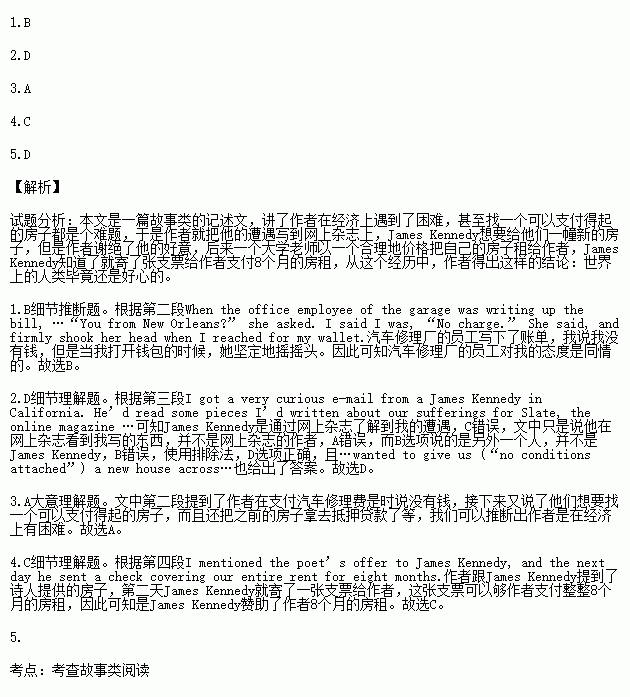题目内容
A month after Hurricane Katrina, I returned home in New Orleans. There lay my house, reduced to waist-high rains, smelly and dirty.
Before the trip, I’d had my car fixed. When the office employee of the garage was writing up the bill, she noticed my Louisiana license plate. “You from New Orleans?” she asked. I said I was, “No charge.” She said, and firmly shook her head when I reached for my wallet. The next day I went for a haircut, and the same thing happened.
As my wife was studying in Florida, we decided to move there and tried to find a rental house that we could afford while also paying off a mortgage (抵押贷款) on our ruined house. We looked at many places, but none was satisfactory. We’d begun to accept that we’d have to live in extremely reduced circumstances for a while, when I got a very curious e-mail from a James Kennedy in California. He’d read some pieces I’d written about our sufferings for Slate, the online magazine and wanted to give us (“no conditions attached”) a new house across the lake from New Orleans.
It sounded too good to be true, but I replied, thanking him for his exceptional generosity, that we had no places to go back. Then a poet at the University of Florida offered to rent his house to me while he went to England on his one-year-paid leave. The rent was rather reasonable. I mentioned the poet’s offer to James Kennedy, and the next day he sent a check covering our entire rent for eight months.
Throughout this painful experience, the kindness of strangers has done much to bring back my faith in humanity. It’s almost worth losing your worldly possessions to be reminded that people are really nice when given half a chance.
1.The garage employee’s attitude toward the author was that of ________.
A. unconcern B. sympathy
C. doubt D. tolerance
2.What do we know about James Kennedy?
A. He was a writer of an online magazine.
B. He was a poet at the University of Florida.
C. He learned about the author’s sufferings via e-mail.
D. He offered the author a new house free of charge.
3.It can be inferred from the text that ________.
A. the author’s family was in financial difficulty
B. rents were comparatively reasonable despite the disaster
C. houses were difficult to find in the hurricane-stricken area
D. the mortgage on the ruined house was paid off by the bank
4. From Paragraph 4, we can know that the author’s new house ________.
A. was located in the University of Florida
B. was offered by a poet and the rent was expensive
C. was sponsored by James Kennedy with its 8-month rent
D. was well-equipped but the rent was low
5.The author learned from his experience that ________.
A. worldly possessions can be given up when necessary
B. generosity should be encouraged in some cases
C. people benefit from their sad stories
D. human beings are kind after all

